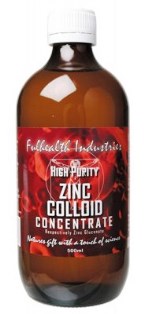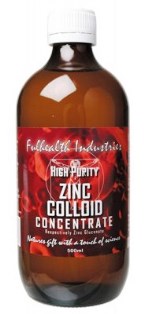FulHealth
Colloidal Zinc 500ml
Colloidal Zinc 500ml
Couldn't load pickup availability
Colloidal Zinc .
Zinc supplement in colloidal form is transparently deposited suspension of 99.9% fine zinc atoms in distilled water. Colloidal zinc supplement is the smallest cell ready zinc solution that the body absorbs completely, unlike tablet mineral supplements which are utilized at a rate of 10%, or less.
Benefits of Zinc.
Zinc is a trace mineral that is essential for all forms of life, including plants, animals, and microorganisms. The chemical symbol for zinc is Zn. Zinc plays important roles in growth and development, neurological function, immune system, and in reproduction.
Our bodies contain approximately 2-3 grams of zinc, which is distributed throughout the body. Zinc is an essential component of over twenty enzymes associated with many different metabolic processes. The highest concentrations of zinc are found in the eyes, liver, bones, prostate, semen, and hair.
Zinc Functions and Uses
*Growth and Reproduction
Perhaps the most critical role zinc plays is in the synthesis of the nucleic acids RNA and DNA, which are essential for cell division, cell repair, and development. Several studies have linked low zinc levels with complications during pregnancy, including miscarriage and birth defects.
Studies have also found large percentages of children to be deficient in zinc. These children showed symptoms of suboptimal growth, in addition to a loss of taste acuity and poor appetite. When their zinc intake was increased, the symptoms improved. Animal studies and human studies of children and adults suggest that lethargy, passivity, and apathy are symptoms of marginal zinc deficiency, since these behavioral problems improve with zinc supplementation.
*Vision
One of the highest concentrations of zinc in the human body is found in the eye, especially the iris and retina. Although the exact mechanisms of its functions are largely unknown, zinc seems to be involved in the activation of vitamin A, and thus is a factor in night vision. It is also an antioxidant and may protect vision by reducing damage from free radicals.
Zinc deficiency may be contributing to the development or progression of chronic eye diseases, such as macular degeneration, the major cause of vision loss among older people.
In one study, the risk of vision loss was reduced by 10 percent in people taking supplements of 80 milligrams of zinc and 2 milligrams of copper . In addition, there is a growing body of evidence that indicates that poor zinc intake is related to such eye conditions are impaired color discrimination; cataract formation; and optic neuritis, the inflammation of the optic nerve.
*Physical and Mental Stress
There is some evidence that zinc levels fall following physical and mental stress. For instance, strenuous exercise has been shown to lead to significant losses of zinc, probably due to the increase in glucose metabolism, which requires zinc.
According to one estimate, up to 90 percent of athletes may not be getting enough zinc. It has also been discovered that zinc is depleted during upper respiratory infection accompanied by fever. In addition, severe burn victims have only two-thirds the normal amount of zinc in their blood. Studies have shown that zinc supplements may have therapeutic value in cases of physical stress.
When hospital patients who were marginally deficient in zinc were given extra zinc, it helped restore the rate of healing to normal. Zinc may therefore be of benefit to people who have undergone surgery or have sustained broken bones or wounds. Some physicians prescribe zinc to stimulate the healing process.
*Taste and Smell
Zinc is especially important in body systems that undergo a rapid turnover of cells. This includes the gastrointestinal system, and particularly the taste buds- a fact that may explain why a change in the ability to taste foods is often an early sign of zinc deficiency. This symptom may be accompanied by similar changes in the ability to smell. Foods may either have no taste or smell at all, or taste or smell unpleasant. All these factors contribute to a loss of appetite, but may be so insidious that they go unnoticed.
Many of elderly patients report a heightened sense of taste after a few weeks of colloidal zinc supplementation. They often find this development quite remarkable, since prior to supplementation, they may not have recognized the loss of taste sensitivity. The elderly may benefit from zinc supplementation in another way, too, as zinc appears to play a role in increasing bone density in post menopausal women.
*The Immune System
Zinc may exert a protective influence by boosting the immune system. Many studies have shown that a zinc deficiency can impair a large variety of immune functions and defense mechanisms in animals, and some studies have shown similar effects in humans. These effects-which include abnormalities and eventual shrinking of the spleen, thymus, and lymph nodes; and impaired production of antibodies-have been found to be correctable with zinc supplementation.
Low zinc levels, often accompanied by high copper levels, have been reported in people with many types of cancer. We've known since 1981 that people with a certain type of lung cancer survived for a significantly longer period of time when they had high levels of zinc in their blood.
It's not surprising that low levels of zinc are also found in people with AIDS. Diabetics tend to have less zinc in their tissues and this may be related to many of their complications. Zinc deficiency may be related to the body's inability to produce the enzymes used in glucose metabolism, insulin resistance, immune problems, loss of ability to taste, and conditions related to oxidative stress.
Since the beneficial effects of zinc on immunity are so well documented, and the therapy is nontoxic and inexpensive, some researchers suggest further studies involving immune deficiency diseases. Many of patients who get frequent colds and sore throats have shown a marked decrease in these outbreaks with zinc supplementation.
*Diabetes
Diabetics tend to have less zinc in their tissues and this may be related to may of their complications. Zinc deficiency may be related to the body's inability to produce the enzymes used glucose metabolism, insulin resistance, immune problems, loss of ability to taste, and conditions related to oxidative stress.
*Anorexia Nervosa
Many studies suggest that there is a relationship between zinc depletion and anorexia nervosa. Researchers theorize that inadequate levels of zinc might somehow help trigger the development of this disease, which further depletes zinc levels, which further worsens disease symptoms, and so on, in a vicious cycle. Many anorexia patients have improved with zinc supplementation, indicating that zinc may be helpful both in the treatment and in the prevention of this serious disease.
*Hormone Levels
Zinc has been shown to inhibit the production of prolactin, a pituitary hormone, and so is used therapeutically in men and women with abnormally high prolactin levels. Elevated prolactin levels can lead to distressing effects such as secretion of breast milk, enlarged breasts, sexual dysfunction, and breast cancer.
*The Prostate Gland
The prostate gland has one of the highest concentrations of zinc in the body. In general, low levels of zinc in the prostate appear to be associated with diseases of the gland. Zinc supplementation has been shown to reduce the size of the prostate and symptoms of benign prostatic hypertrophy (BPH) in the majority of patients. Zinc also inhibits the binding of androgens to receptors in the prostate gland, an action that may play a role in the prevention of prostate cancer and other diseases of the prostate gland.
*Other Protective Functions
Aside from its support of the immune system, zinc may protect the body in a variety of other ways. For instance, zinc has been shown to protect the liver from damage due to poisoning from the common cleaning solvent carbon tetrachloride.
Zinc is also known to prevent the absorption of lead and cadmium, which we may be exposed to through our drinking water, car and bus exhaust fumes, and many other environmental factors. Through its influence on cell membrane stability, zinc may even help protect us from substances known to contribute to cancer, heart disease, and a variety of other disorders. Zinc is an essential component of super-oxide dismutase (SOD), an antioxidant made by the body to combat free radicals.
Disclaimer: These statements have not been evaluated by the TGA. Zinc products are not intended to diagnose, treat, cure or prevent any disease.


